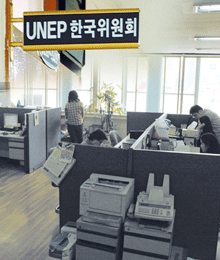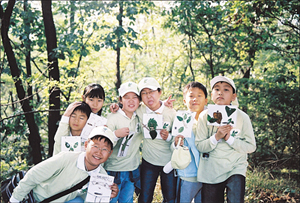Are you doing your job? UNEP is doing it for you!
| EDITOR'S NOTE | Kim In-youb, Editor of International Div. HAVE YOU ever heard the words, "Word Environment Day" or "UNEP (United Nations Environment Program)"? In fact, June 5 is declared as "World Environment Day" even though many people may not notice. While one may know the fact that June 5 is the day set aside for environmental awareness, he or she regards it as an empty day without any action or effort taken on behalf of the environment. However, various NGOs (Non Government Organizations) have been advancing the special project or program for the day with UNEP. In other words, UNEP is the organization managing World Environment Day! UNEP was established to protect the environment from excessive pollution. Actually, it has been operating a variety of programs since 1972. Commemorating World Environment Day, The Yonsei Annals introduces UNEP's activities through our "International" column in June. We hope you have a chance to think about the UNEP staffs' struggles for our environment while reading this exciting and informative column. |
JUNE 5, does it ring a bell to you? It is a day when people all over the world are united by one single passion. A day when politicians, activists, leaders from countries worldwide speak out about a common issue. A day when countries in conflict become one to discuss a threat to all mankind. Still not familiar with this day? Then, you are ignorant of one of the most important dates on the environmental calendar. June 5 is World Environment Day (WED), a day designated to save the earth’s precious resources for the benefit of mankind. Just who is behind this day? The group that makes it happen is UNEP (United Nations Environment Prog-ramme). The Yonsei Annals finds out how this organization functions and what work is being done by these environmentalists.
Introduction of UNEP
UNEP was first devised in 1972. Established according to the declaration of "Human Environment Treaty" at the 1972 UNCHE (United Nations Conference on Human Environment) it was first certified at the 27th United Nations General Assembly in that same year.
UNEP was founded to coordinate UN (United Nations) environmental activities, assist developing countries in implementing environmentally sound policies and to encourage sustainable development through sound environmental practices. Its activities cover a wide range of issues, from atmosphere and terrestrial ecosystems, the promotion of environmental science and information, to an early warning and emergency response capacity to deal with environmental disasters and emergencies. The organization also files reports about population growth, city expansions, and urbanization every year and informs governments around the globe about serious environment issues. Every five years, UNEP also publishes an overall brief about the environmental status of the world.
Currently, UNEP has its headquarters in Nairobi, Kenya and is headed by Klaus Topfer, the executive director of UNEP. Its funding is mainly provided for by the UN and other monetary support is supplied by contributions from many governments of different countries. Famous companies and organizations also perform a big role in keeping UNEP's economic status steady.
The UNEP Committee for the
Republic of Korea
Every country that supports the UN is a member of UNEP, and Korea is no exception. Apart from being a member (becoming a member means that you have a UNEP office in your country), some countries have established committees to interact more actively with the UNEP headquarters. This goes for Korea as well. In 1995, the UNEP Committee for the Republic of Korea was founded, with Korea being the 13th country in the world to do so. Ever since, workers and members have been working hard to promote not only international environment issues but also problems that exist on the Korean peninsula.
Currently the National Committee of UNEP Korea is focusing on three main issues. The first is publishing. Publishing books and magazines is a key method that UNEP uses to enlighten the world about environmental issues. The National Committee of UNEP translates these publications and ensures that they are easily accessible. Magazines such as "Our Planet" and "Tunza" are also added with articles reporting environmental news about the peninsula. "At the UNEP Committee for the Republic of Korea, we put great importance on the magazines," says Kim Seung-hyun. (Team of Communication & International Coorperation, UNEP Committee for the Republic of Korea) "This is why we work hard to publish them as soon as they are sent to us from the headquarters." Kim also adds that the response to these magazines is energetic, "it is difficult to get publications on the environment of this quality in Korea. We believe that these publications will increase people's interest in the protection of the environment." Apart from these magazines, books about many environmental treaties such as Kyoto Protocol (a treaty reinforced to reduce the greenhouse effect in the Earth's atmosphere) are also provided to those interested in the environment. By such publishing and information provision, the committee aims at connecting Korea with the main UNEP. 
▲ The UNEP Committee office in Seoul.
The second main agenda is activities for youth. Youth is a generation to be treasured to the National Committee of Korea. Currently there are many programs for children, teenagers and young adults. For the children, education is a key project and this is held in many forms. The main goal of UNEP Korea is to provide practical and useful education, not boring ones that are commonly found in elementary schools. "The problem is that in Korea, the wrong form of environmental education is given to children, even as we speak," says Kim. "Environment is an issue that we must feel passionate about, not bored. Many people are just about sick and tired of the word 'environment' by now - this is a perception we want to change."
Education is not the only activity for the Committee for the Republic of Korea. Activist groups are also available for all ages. "E-Paran", a children's activist group, was established in 2000. Many events are held for children that have an interest in this team. Recently in May, a writing and drawing contest was held to imply the importance of "Green Cities" (coincidently this year's topic for WED). UNEP Korea enables children to communicate with peers in other countries through ICC (The International Children's Conference on the Environment). For passionate middle and high school students, a more intense group is available. GYR (Global Youth Retreat) and GYF (Global Youth Forum) are both international youth groups associated with the UNEP. Students from all countries can meet together to debate on how they can help save the Earth. As for university students, there is a group called "UNEP Angels" and this is possibly the team that does the most work. Students in their early twenties from all over the peninsula communicate mainly through the internet to share ideas on how to save the environment. These youngsters show up at environmentally damaged sites and ponder the solutions. 
▲ The children's organizatoin - ICC
The third mission of the Committee is to organize events. As saving the environment is a job that is impossible to be solved singularly, the team is working hard to co-corporate with other NGOs (Non-Government Organizations) in Korea. The committee frequently has sessions with such organizations to discuss several environmental issues. Another important day for both the UNEP and NGOs is World Environment Day, the one day when these people get to show fellow Koreans their hard work.
Existing difficulties
Though the Committee for the Republic of Korea has increased significantly in size, many problems still exist for this group. Fundamentally, for an organization of this extent to operate smoothly, it needs funding. Though the Asian Pacific Region Office in Thailand supports the committee financially, it is not nearly enough to capitalize the accounts needed. Many companies in Korea are now sponsoring UNEP Korea, but it is still not possible to say that the provisions are sufficient. "It is true that working to save the environment is a 'hungry' job," says Kim. "However, we prefer to maintain our government-free status as that way, we are able to make our plans freely," Kim adds.
Perhaps due to the monetary problems, UNEP Korea is not able to be active on a large scale as it should. Many people in Korea still do not know about UNEP or the Committee for the Republic of Korea at all. Those who do have the slightest idea about UNEP, still have no idea about the activities of the organization. This problem is not just one of how one knows or does not know. It is a severe calamity as it influences the Committee's placement in the world. Although one of the Committee's missions is to inform the world about the environmental problems in Korea, this function is not carried out smoothly. Many obstacles exist and the ignorance of the Korean people is not helping.
Fundamentally the biggest problem that exists is the lack of interest of Koreans in the environment itself. "For me and my fellow workers, the financial problems are ones than can be coped with," states Kim. "However, the ignorance of Koreans in environmental issues is quite frankly rather disturbing." she comments. "If only the people had more interest in nature's elements, then half our difficulties will be resolved," Kim sighs.
The key to the problem
In order for the committee of Korea to operate smoothly, more financial support is essential. As the committee is a non-governmental organization, it is impossible to expect government contributions. That is why private entities need to play their part more effectively. More sponsorship is desperately needed and contributing needs to be seen as a duty, not a burden. Along with such donations, the UNEP committee must also create methods to raise funds.
The committee also needs to broaden its social infrastructure. There is no point in having a fully-functioning environmental group if it is not well known. Although the biggest fault may be at the people for not taking interest, the Korean Committee is not without fault either. "It is true that we are not introducing Korea's problems to international countries properly. We need more work in that area," affirms Kim. UNEP also needs to make more projects and events that will interest even those who do not know anything about the environment. Street propaganda, television commercials and even minor details such as website updates will all play a role in bringing UNEP to the people. Increasing participation for the WED will also prove to be effective.
Fundamentally, Koreans need to have more interest in the environment. Many Koreans have a tendency to ignore environmental issues and consider it as a responsibility of others. However this attitude needs to change and everyone must embrace it as their own task. Once people sense that they have a role in saving the environment, many things will be liable to change.
In the future
The environment is not a phenomenon that was created overnight. Nor was it one that was damaged in a short period. This means that the environment is an issue that needs great care, interest, long sight and participation. For this to happen, the UNEP needs to continue with its good work and the people should appreciate their activities more. With the help of everyone and the good work of the UNEP, we might just be able to make it a better world for everyone to live in.

World Environment Day
All the Facts That You Need to Know!
| WORLD ENVIROMENT Day (June 5) is a day when United Nations calls for worldwide awareness of the environment and enhances political attention and action. Every year a specific theme is chosen, along with a host city for the main international celebrations of WED. This year the theme is "Green Cities" and the slogan is "Plan for the Planet". This year, San Francisco will be the moderator for the five day event. Many advents such as street rallies, bicycle parades, green concerts, essays and poster competitions in schools, tree planting, as well as recycling and clean-up campaigns are to be held during this period. The 2005 WED theme was devised due to the increase pollution in cities. In six decades since the Charter of the United Nations was signed in San Francisco, the world population has more than doubled, now surpassing six billion. As cities grow - from migration or from increases in population - their inhabitants need a well-planned, clean, healthy and safe environment. This is what UNEP hopes to achieve through the 2005 WED. |
| INTERVIEW | Kim Seung-hyun (UNEP Korea) Q: Are there any qualities needed to work at UNEP? Q: How can university students take part in saving the environment? | ||||||||||||
SPOTLIGHT | K.H.B
AS SHAMEFUL as I am to admit this, truth be told, I once thought that I had a great interest and somewhat respectable amount of knowledge about the environment. I was still under this false impression when I decided to write about this subject for this month's "International". Little did I know how ignorant I was on this area ? a fact that became eminent to me as I started my research.
While I was writing my article, I came to learn that the environment is not a "sophisticated" subject for intellectuals. There are ever so many treaties and regulations about the world's resources and important as they may be, they are much unknown by the majority of people. I think this is one of the reasons the environment is not embraced as an "urgent" issue by most people. A new treaty is made- politicians come together, sign a few papers, yet to us, the environment is just as polluted as ever. Some may probably regard saving the environment as a task for a very few activists. After all if someone is willing to go to disaster areas in unknown places, why bother?
Although I must confess that I am also one of those people described above, I cannot say that I am proud of it. The environment is polluted by everybody, thus it takes the alliance of all six billion people in the world to renew it. The future is in our hands, will you accept the responsibility?


